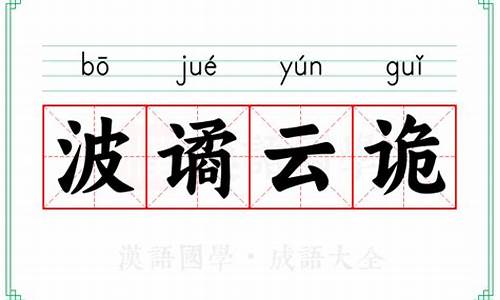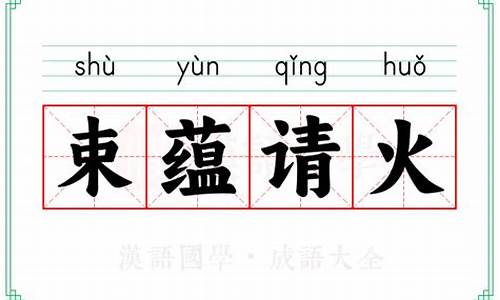三思而行英语-学而后知不足英语
1.think over,think about,think of,think的区别是什么?何时用他们?
2.初中常用英语谚语
think over,think about,think of,think的区别是什么?何时用他们?

牛津高阶英汉双解词典
think 1
/ θk; θk/ v (pt, pp thought / θt; θ?t/)
[I, Ipr]~ (about sth) use the mind in an active way to form connected ideas 想; 思索; 思考: Are animals able to think? 动物能思考吗? * Think before you act, ie Do not act hastily or rashly. 先思而後行. * Let me think a moment, ie Give me time to think before I answer. 让我考虑一下. * He may not say much but he thinks a lot. 别看他说得不多, 但他想得很多. * Do you think in English or translate mentally from your own language? 你是用英语思考呢, 还是在头脑中把自己的语言翻译过来呢? * You're very quiet what are you thinking (about)? 你静静的不出声, 想什麽呢?
[Tf, Tw no passive 不用於被动语态, Cn.t esp passive 尤用於被动语态, Cn.a, Cn.n] have as an idea or opinion; consider 认为; 以为: `Do you think (that) it's going to rain?' `Yes, I think so.' ‘你认为会下雨吗?’‘我想可能下.’ * `It's going to rain, I think.' `Oh, I don't think so.' ‘我看快要下雨了.’‘嗳, 我看下不了.’ * I think you're very brave. 我认为你很勇敢. * I think this is their house but I'm not sure. 我想这是他们家, 但不敢肯定. * Do you think it likely/that it is likely? 你认为这事可能吗? * I thought I heard a scream. 我好像听到了一声尖叫. * What do you think she'll do now? 现在你认为她要干什麽? * Who do you think you are? ie Why are you behaving in this overbearing, etc way? 你以为你很了不起吗? * a species long thought to be extinct 早就认为已经灭绝的种类 * He's thought to be one of the richest men in Europe. 人们认为他是欧洲最大的富翁之一. * You must think me very silly. 你准认为我很蠢. * Some people think him a possible future champion. 有些人认为他可能是未来的冠军.
[Tf] have or form as an intention or plan 有意; 打算; 计画: I think I'll go for a swim. 我想游泳去. * It is thought that the Prime Minister will visit Moscow next month. 据估计首相於下月访问莫斯科.
[Tw no passive 不用於被动语态] (used in negative sentences with can/could 用於否定句, 与can/could连用) form an idea of; imagine 料想; 想像: I can't think what you mean. 我想像不出你是什麽意思. * We couldn't think where she'd gone to. 我们想不出来她到哪里去了. * You can't `think how glad I am to see you! 你无法想像我见到你有多高兴!
[Tw no passive 不用於被动语态] take into consideration; reflect 考虑; 深思; 细想: Think how nice it would be to see them again. 想想能再次见到他们该有多好哇. * I was just thinking (to myself) what a long way it is. 我刚才还在琢磨着这条路多长啊.
[Tn, Tf, Tt] expect (sth) 预料到, 料想到(某事): Who'd have thought it? eg of a surprising event 谁能料到有这样的事呢? * I never thought (that) I'd see her again. 我从未想到还能见到她. * Who would havethought to find you here? 谁能料到你在这儿呢?
[I, Tn](infml 口 esp US) direct one's thoughts in a certain manner or to (a subject) 朝某一方面想; 专想(某件事): Let's think positive. 我们往好的方面想想吧. * If you want to make money you've got to think money. 你要是想赚钱, 脑子里就得想着钱.
(idm 习语) I `thought as much that is what I expected or suspected 我就是这麽想的; 果然不出我所料. see/think fit => fit1. ,think a`gain reconsider the situation and change one's idea or intention 重新考虑情况并改变想法或意图: If you think I'm going to lend you my car you can think again!你要是以为我能把汽车借给你, 你还是另打主意吧! think a`loud express one's thoughts as they occur 边想边说出声来; 自言自语. think better of (doing) sth decide against (doing) sth after thinking further about it (深思後)决定不采纳某事物或不做某事. think (all) the better of sb have a higher opinion of sb 对某人有更高的评价. think nothing `of it (used as a polite response to apologies, thanks, etc 用作回应道歉﹑ 感谢等的客气话). think nothing of sth/doing sth consider(doing) sth to be normal and not particularly unusual认为(做)某事很平常﹑ 不特殊: She thinks nothing of walking thirty miles a day. 她觉得一天走三十英里无所谓. think twice about sth/doing sth think carefully before deciding to do sth 认真考虑後再决定做某事: You should think twice about employing someone you've never met. 你要雇用素未谋面的人应三思而行. think the world, highly, a lot, not much, poorly, little, etc of sb/sth (not used in the continuous tenses 不用於进行时态) have a good, poor, etc opinion of sb/sth对某人[某事物]评价高﹑ 不高等: His work is highly thought of by the critics. 他的作品深受评论家推崇. * I don't think much of my new teacher. 我认为我们的新老师不怎麽样.
(phr v) think about sb/sth (a) reflect upon sb/sth; recall sb/sth 回想或想起某人[某事]: Do you ever think about your childhood? 你是否回忆过童年的事? (b) take sb/sth into account; consider sb/sth 考虑到某人[某事物]: Don't you ever think about other people? 你从来就不考虑考虑别人吗? * All he ever thinks about is money. 他想的只是钱. think about sth/doing sthconsider or examine sth to see if it is desirable, practicable,etc 考虑或盘算某事(看是否可取﹑ 可行等): I'll think about it and let you know tomorrow. 我要把这事仔细想想, 明天再给你回话. * She's thinking about changing her job. 她正考虑要换个工作.
think ahead (to sth) cast one's mind forward; anticipate(an event, a situation, etc) 预想, 预见(某事﹑ 某情况等).
think back (to sth) recall and reconsider sth in the past 想起并重新考虑(过去的)某事; 反思.
think for oneself form one's opinions, make decisions, etc independently 独立思考(形成看法﹑ 做出决定等).
think of sth/doing sth (a) take sth into account; consider sth 考虑到某事物: There are so many things to think of before we decide. 我们要考虑到许多方面然後才能做决定. * You can't expect me to think of everything! 你不能指望我把什麽事都想到了! (b) contemplate the possibility of sth (without reaching a decision or taking action) 考虑某事的可能性(未做出决定亦未采取行动): They're thinking of moving to America. 他们有意移居美国. * I did think of resigning, but I decided not to.我原来确实打算辞职, 但後来打消了这个念头. (c) imagine sth 想像某事物: Just think of the expense! 想想这笔开销吧! * To think of his not knowing (ie How surprising that he didn't know) about it! 想想看, 他对此事竟一无所知! (d) have the idea of sth 对某事物有见解 (often used with could, would, should, and not or never 常与could﹑ would﹑ should及not﹑ never连用): I couldn't think of letting you take the blame. 我没想到过能让你承担责任. * She would never think of marrying someone so old. 她从未想过嫁给年纪这麽大的人. (e) call sth to mind; remember sth 想起或记得某事物: I can't think of his name at the moment. 我一时想不起他的名字了. (f) put sth forward; suggest sth 提出或建议某事: Can anybody think of a way to raise money? 有人能想出筹款的办法吗? * Who first thought of the idea? 是谁先出的这个主意?
think sth out consider sth carefully; produce (an idea, etc) by thinking 仔细思考某事; 想出(主意等): Think out your answer before you start writing. 要想好答案再动笔. * a well-thought out plan 考虑周详的计画.
think sth over reflect upon sth (esp before reaching a decision) 慎重思考某事(尤指做出决定之前): Please think over what I've said. 请仔细考虑我说的话. * I'd like more time to think things over. 我要多用些时间把事情好好想想.
think sth through consider (a problem, etc) fully 全面地考虑(问题等).
think sth up (infml 口) produce sth by thought; invent or devise sth 想出﹑ 发明出或设计出某事物: There's no telling what he'll think up next. 谁也不知道他下次会想出什麽花样. * Can't you think up a better excuse than that? 难道你想不出比这个藉口更像样的了吗?
# `think-tank n [CGp] organization or group of expertsproviding advice and ideas on national or commercial problems (国家的或商业的)智囊团, 专家小组. think 2
/ θk; θk/ n (infml 口)
[sing] act of thinking 思索; 思考; 考虑: I'd better have a think before I decide. 我最好还是先想想再做决定.
(idm 习语) have(got) another think coming must revise one's opinions,plans, etc; be forced to think again 必须修改个人的意见﹑ 计画等; 不得不重新考虑: If you think I'm going to pay all your bills you've got another think coming. 你要是以为我会替你付清帐单, 你还是再琢磨琢磨去吧.
consider,think,believe,count,deem,reckon,regard
这些动词均含有“认为”之意。
consider → 指经过考虑和观察后得出的结论。
think → 普通用词,指按照自己的意见提出看法。
believe → 通常指根据一定的证据,经思考后而认为属实。
count → 指作出判断后而得出的看法等。
deem → 正式用词,常用于法律、文学,强调作判断而不是思考。
reckon → 指对人或事作全面“权衡”,把各方面意见考虑进去后得出结论。
regard → 侧重凭外表或表面现象作判断。多强调观点。
think,conceive,imagine,fancy,realize
这些动词均可表示“在思想中形成一个看法或观念”之意。
think → 最普通用词,指想或思索,也指由反复思考而作出判断或得出结论等。
conceive → 指在头脑中组织好自己的思想,在心中形成一个系统的思想或一个见解。
imagine比conceive更强调形象思维,指在头脑中形成一个清晰明确的意象。
fancy与imagine略不同,往往指的是不切实际的,属于梦幻般的想象。
realize → 指领悟,通过生动的构思或想象从而抓住事物的本质。
think,deliberate,meditate,muse,reason,reflect,speculate
这些动词均有“思考、判断、思索”之意。
think → 一般用词,指开动脑筋形成看法或得出结论的脑力活动。不着重结论是否正确,见解是否有用。
deliberate → 指缓慢、按部就班地作仔细而认真的思考或判断。
meditate → 语气较强,指认真地长时间集中精力进行思考。
muse → 通常指漫无目的地猜想。
reason → 指根据资料、证据或事实进行推断,作出结论或判断的逻辑思维活动。
reflect → 指回想或回顾,侧重认真而冷静地反复地思考某个问题,尤指对已发生事情的思索。
speculate → 指推论过程,隐含在证据不足的基础上作出推测或设想。
初中常用英语谚语
1、Youth looks fore of the people all the time, and all of the people some of the time; but you can't fool all of the people all the time.
你可以一直愚弄一些人,甚至可以在某个时期愚弄所有的人;但不能一直愚弄所有的人。
5、You cannot judge a tree by its bark.
人不可貌相。
6、You can do more than strike .
年长智也增。
16、Yesterday is dead, forget it; tomorroelets (or omeletts) without breaking eggs.
有失才有得。
26、You make the failure complete when you stop strying.
不再努力之时,就是完全失败之日。
27、You cannot sell the cow and sup the milk.
你不可能出售乳牛,同时又要喝牛奶。
28、You cannot have two forenoons in the same day.
一日之中不可能有两个上午。
29、You can take a horse to the water but you cannot make him drink.
强扭的瓜不甜。
30、You never know what you can till you try.
是驴子是马,拉出来遛遛。
31、You can take a horse to the water but you cannot make him drink.
马到河边不喝水,逼马低头亦枉然。(不要逼人做他不愿做的事)
32、Youth is life's seed-time.
青年时代是人生的播种期。
33、You may know the horse by his harness.
欲知马如何,可看套马索。
34、You can't make bricks without straw.
没有稻草,制砖难搞。
35、You cannot burn the candle at both ends.
蜡烛不能两头点,精力不可过分耗。
36、You must not pledge your own health.
切不可把健康作孤注一掷。
37、You (or One) cannot make a silk purse out of a sow's ear.
粗瓷碗雕不出细花来 span style="font-size: 12px;color: #9E9E9E;">m.J458.cOm 英语常用谚语
英语常用谚语_
1、
承认错误,等于改正一半。
A fault confessed is half redressed.
2、
英雄犯大错误。
Heroes make great mistakes.
3、
人要衣装。
Clothes make the man.
4、
读书养神,锻链健身。
Reading nourishes the mind, exercise the body.
5、
现钱等于成药。
Ready money is ready medicine.
6、
一件事情三个人知道就人人知道。
A thing knoent becomes a lifelong regret.
12、
要想活得痛快,身上不能背债。
He that e to an end.
100、
旧船必漏。
Old vessels must leak.
常用英语谚语1、Life is a comedy to him e, lightly go.
易得易失。
25、Little pigeons can carry great messages.
少年也可以成大事。
26、Little thieves are hanged, but great one's escape.
窃钩者诛,窃国者侯。
27、Loftiest trees most dread the thunder.
树大招风。
28、Live and learn.
活到老,学到老。
29、Look at the pass.
生活没有目标,犹如航海没有罗盘。
39、Look before you leap; see before you go.
三思而行。
40、Like kno live.
自己生活,也要让他人生活。
45、Long tarrying takes all the thanks away.
事情耽搁太久就没有人会感谢了。
46、Little bodies may have great souls.
小小的躯体会有伟大的心灵。
47、Life is measured by thought and action, not by time.
生命的价值是用思想和行为来衡量的,而不是寿命的长短。
48、Life is but a span.
人生如朝露。
49、Littel chips light great fires.
星星之火,可以燎原。
50、Like cures like.
以毒攻毒。 生活中常用英语句子
1、Do you have some change?
你有零钱吗?
2、Forget it.
算了吧。
3、Could you take a picture for me?
你能帮我拍照吗?
4、Did you have a nice holiday?
你假期过得愉快吗?
5、Don't be so modest.
别这么谦虚。
6、Don't miss the boat.
不要坐失良机。
7、Can I help?
要我帮忙吗?
8、Don't e feedback?
你能给我一些建议吗?
21、Do you often available?
你们有空房间吗?
34、Are you used to the food here?
你习惯吃这儿的饭菜吗?
35、Be my guest.
请便/别客气。
36、Dinner is on me.
晚饭我请客。
37、Did you enjoy your flight?
你的飞行旅途愉快吗?
38、Easy come,easy go.
来得容易,去得快。
39、Are you free tomorroe in and make yourself at home.
请进,别客气。
55、Absolutely.
(用于答话)是这样;当然是;正是如此;绝对如此。
56、Could you drop me off at the airport?
你能载我到飞机场吗?
57、Enjoy your meal.
请慢慢享用吧。
58、Give my best to your family.
代我向你们全家问好。
59、Don't bother.
不用麻烦了。
60、Don't get me Mary?
你收到玛丽的来信吗?
63、Do you mind my smoking?
你介意我抽烟吗?
64、Have you ever been to Japan?
你去过日本吗?
65、Have you got that?
你明白我的意思吗?
66、Better late than never.
迟到总比不到好。
声明:本站所有文章资源内容,如无特殊说明或标注,均为采集网络资源。如若本站内容侵犯了原著者的合法权益,可联系本站删除。












